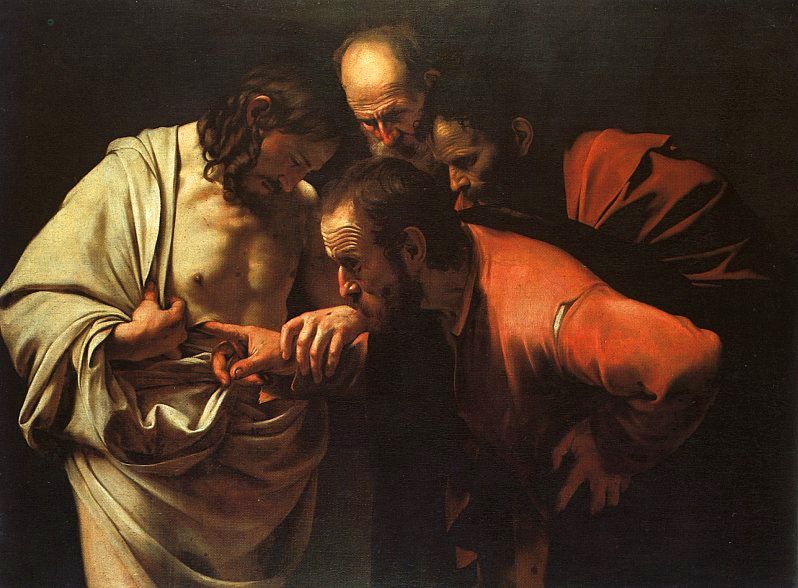“Dominus meus et Deus meus”: St Thomas the Apostle encourages us to cast aside our own doubts
There’s a story about the atheist philosopher Bertrand Russell being asked what he would say if he found himself standing before God on the Day of Judgement and God asked him “Why didn’t you believe in Me?” Russell replied: “I would say, Not enough evidence, God! Not enough evidence!” For some people, no amount of The post “Dominus meus et Deus meus”: St Thomas the Apostle encourages us to cast aside our own doubts appeared first on Catholic Herald.

There’s a story about the atheist philosopher Bertrand Russell being asked what he would say if he found himself standing before God on the Day of Judgement and God asked him “Why didn’t you believe in Me?” Russell replied: “I would say, Not enough evidence, God! Not enough evidence!”
For some people, no amount of evidence would convince them to believe in God and in Jesus’s Resurrection. But the famous example of St Thomas the Apostle’s disbelief was not that of a cynical atheist. When the other apostles told Thomas that Jesus had risen from the dead, he very much wanted it to be true – but he just found it too astonishing to accept. We are reminded of this every year in the Gospel for his feast day on July 3.
However, when Thomas finally met the risen Christ, he not only accepted that Christ had risen from the dead, but he went way beyond what any of the other apostles said. In his confession, “My Lord and my God”, Thomas was admitting that Jesus Christ is truly divine. But it was not because of the empirical evidence that Thomas was able to say this, for no amount of empirical evidence could make anyone believe in Christ’s divinity. It was only by the gift of faith that Thomas could say that Jesus Christ is divine. Thomas the Apostle is therefore not venerated as a saint because of his doubt, but because of his act of faith when he finally did encounter the risen Christ.
For many people in the modern world, doubt is not something to be avoided, but rather to be embraced. Scepticism is often held up as a model of virtue – that the only way to attain any reliable certainty is to start from a position of doubt. René Descartes was one of the pioneers of this approach. When he tried to doubt as much as was conceivably possible, the only thing he was unable to doubt was that he could think. It was from this one indubitable proposition that Descartes built up the whole of his philosophy.
Although there are those – plenty of them – who remain unconvinced by the conclusions that Descartes drew, the method of doubt has clearly been very successful in the realm of natural science. After all, our modern technology has depended on scientists coming up with hypotheses that have been so rigorously tested that they can be doubted no longer. This is all well and good in the realm of science, but the problem is when this methodology is applied to absolutely everything else. For there is surely a virtue to doubting; this doesn’t mean doubting everything, but rather it means knowing when it is good to doubt and when it is good simply to believe. For instance, doubting the reliability of unexpected results might be a good default position in the science lab, but it is not a very good default position in the area of human relationships. If we are to relate properly to one another, there needs to be a degree of trust and a readiness to take what people say at face value. We therefore have to find that mean between always doubting and always believing.
But when it comes to the Resurrection of the Lord, there is no virtue in doubting it at all. Of course, we still need evidence to believe in the Resurrection, but we do have evidence. We have the Gospels, we have the witnesses of the martyrs and we have the living tradition of the Church. This is all the evidence we need, and to ask for more evidence is to lack the virtue of knowing when to put doubts aside.
This virtue requires humility. It requires us to accept that the deepest truths of all are not something we can work out for ourselves – we can only be told of them. Although we may sometimes struggle to believe the truths that God has revealed to us, the example of Thomas the Apostle shows us that even disbelief has a role to play in Christ’s redeeming work, for Thomas’s disbelief provides the occasion for the Risen Christ to reveal His love and mercy with such clarity that all doubt is cast away. As Pope St Gregory the Great put it: “The unbelief of Thomas is more profitable to our faith, than the belief of the other disciples; for, the touch by which he is brought to believe, confirms our minds in belief, beyond all question.”
So on the feast of St Thomas the Apostle, we would do well to ask for his intercession that we might cast aside our doubts in our response to the evidence of Christ’s Resurrection.
![]()
The post “Dominus meus et Deus meus”: St Thomas the Apostle encourages us to cast aside our own doubts appeared first on Catholic Herald.














